- Home
- John le Carré
Smiley's People Page 6
Smiley's People Read online
Page 6
A verse of Auden’s rang in his mind from the days when he was Mostyn’s age: Let us honour if we can/The vertical man/ Though we value none/But the horizontal one. Or something.
And why Smiley? he thought. Above all, why me? Of all people, when as far as they’re concerned I’m deader than old Vladimir.
“Will you have tea, Mr. Smiley, or something stronger?” called Mostyn through the open kitchen doorway. Smiley wondered whether he was naturally so pale.
“He’ll have tea only, thank you, Mostyn!” Lacon blurted, making a sharp about-turn. “After shock, tea is a deal safer. With sugar, right, George? Sugar replaces lost energy. Was it gruesome, George? How perfectly awful for you.”
No, it wasn’t awful, it was the truth, thought Smiley. He was shot and I saw him dead. Perhaps you should do that too.
Apparently unable to leave Smiley alone, Lacon had come back down the room and was peering at him with clever, uncomprehending eyes. He was a mawkish creature, sudden but without spring, with youthful features cruelly aged and a raw unhealthy rash around his neck where his shirt had scuffed the skin. In the religious light between dawn and morning his black waistcoat and white collar had the glint of the soutane.
“I’ve hardly said hullo,” Lacon complained, as if it were Smiley’s fault. “George. Old friend. My goodness.”
“Hullo, Oliver,” said Smiley.
Still Lacon remained there, gazing down at him, his long head to one side, like a child studying an insect. In his memory Smiley replayed Lacon’s fervid phone call of two hours before.
It’s an emergency, George. You remember Vladimir? George, are you awake? You remember the old General, George? Used to live in Paris?
Yes, I remember the General, he had replied. Yes, Oliver, I remember Vladimir.
We need someone from his past, George. Someone who knew his little ways, can identify him, damp down potential scandal. We need you, George. Now. George, wake up.
He had been trying to. Just as he had been trying to transfer the receiver to his better ear, and sit upright in a bed too large for him. He was sprawling in the cold space deserted by his wife, because that was the side where the telephone was.
You mean he’s been shot? Smiley had repeated.
George, why can’t you listen? Shot dead. This evening. George, for Heaven’s sake wake up, we need you!
Lacon loped off again, plucking at his signet ring as if it were too tight. I need you, thought Smiley, watching him gyrate. I love you, I hate you, I need you. Such apocalyptic statements reminded him of Ann when she had run out of money or love. The heart of the sentence is the subject, he thought. It is not the verb, least of all the object. It is the ego, demanding its feed.
Need me what for? he thought again. To console them? Give them absolution? What have they done that they need my past to redress their future?
Down the room, Lauder Strickland was holding up an arm in Fascist salute while he addressed Authority.
“Yes, Chief, he’s with us at this moment, sir. . . . I shall tell him that, sir. . . . Indeed, sir. . . . I shall convey to him that message. . . . Yes, sir. . . .”
Why are Scots so attracted to the secret world? Smiley wondered, not for the first time in his career. Ships’ engineers, Colonial administrators, spies. . . . Their heretical Scottish history drew them to distant churches, he decided.
“George!” Strickland, suddenly much louder, calling Smiley’s name like an order. “Sir Saul sends you his warmest personal salutations, George!” He had swung round, still with his arm up. “At a quieter moment he will express his gratitude to you more fittingly.” Back to the phone: “Yes, Chief, Oliver Lacon is also with me and his opposite number at the Home Office is at this instant in parley with the Commissioner of Police regarding our former interest in the dead man and the preparation of the D-notice for the press.”
Former interest, Smiley recorded. A former interest with his face shot off and no cigarettes in his pocket. Yellow chalk. Smiley studied Strickland frankly: the awful green suit, the shoes of brushed pigskin got up as suède leather. The only change he could observe in him was a russet moustache not half as military as Vladimir’s when he had still had one.
“Yes, sir, ‘an extinct case of purely historic concern,’ sir,” Strickland went on, into the telephone. Extinct is right, thought Smiley. Extinct, extinguished, put out. “That is precisely the terminology,” Strickland continued. “And Oliver Lacon proposes to have it included word for word in the D-notice. Am I on target there, Oliver?”
“Historical,”Lacon corrected him irritably. “Not historic concern. That’s the last thing we want! Historical.” He stalked across the room, ostensibly to peer through the window at the coming day.
“It is still Enderby in charge, is it, Oliver?” Smiley asked, of Lacon’s back.
“Yes, yes, it is still Saul Enderby, your old adversary, and he is doing marvels,” Lacon retorted impatiently. Pulling at the curtain, he unseated it from its runners. “Not your style, I grant you—why should he be? He’s an Atlantic man.” He was trying to force the casement. “Not an easy thing to be under a government like this one, I can tell you.” He gave the handle another savage shove. A freezing draught raced round Smiley’s knees. “Takes a lot of footwork. Mostyn, where’s tea? We seem to have been waiting for ever.”
All our lives, thought Smiley.
Over the sound of a lorry grinding up the hill, he heard Strickland again, interminably talking to Saul Enderby. “I think the point with the press is not to play him down too far, Chief. Dullness is all, in a case like this. Even the private-life angle is a dangerous one, here. What we want is absolute lack of contemporary relevance of any sort. Oh, true, true, indeed, Chief, right—” On he droned, sycophantic but alert.
“Oliver—” Smiley began, losing patience. “Oliver, do you mind, just—”
But Lacon was talking, not listening. “How’s Ann?” he asked vaguely, at the window, stretching his forearms on the sill. “With you and so forth, I trust? Not roaming, is she? God, I hate autumn.”
“Fine, thank you. How’s—” He struggled without success to remember the name of Lacon’s wife.
“Abandoned me, dammit. Ran off with her pesky riding instructor, blast her. Left me with the children. The girls are farmed out to boarding-schools, thank God.” Leaning over his hands, Lacon was staring up at the lightening sky. “Is that Orion up there, stuck like a golf ball between the chimney-pots?” he asked.
Which is another death, thought Smiley sadly, his mind staying briefly with Lacon’s broken marriage. He remembered a pretty, unworldly woman and a string of daughters jumping ponies in the garden of their rambling house in Ascot.
“I’m sorry, Oliver,” he said.
“Why should you be? Not your wife. She’s mine. It’s every man for himself in love.”
“Could you close that window, please!” Strickland called, dialling again. “It’s bloody arctic down this end.”
Irritably slamming the window, Lacon strode back into the room.
Smiley tried a second time: “Oliver, what’s going on?” he asked. “Why did you need me?”
“Only one who knew him, for a start. Strickland, are you nearly done? He’s like one of those airport announcers,” he told Smiley with a stupid grin. “Never done.”
You could break, Oliver, thought Smiley, noticing the estrangement of Lacon’s eyes as he came under the light. You’ve had too much, he thought in unexpected sympathy. We both have.
From the kitchen the mysterious Mostyn appeared with tea: an earnest, contemporary-looking child with flared trousers and a mane of brown hair. Seeing him set down the tray, Smiley finally placed him in the terms of his own past. Ann had had a lover like him once, an ordinand from Wells Theological College. She gave him a lift down the M-4 and later claimed to have saved him from going queer.
“What section are you in, Mostyn?” Smiley asked him.
“Oddbins, sir.” He crouched, level to the table, di
splaying an Asian suppleness. “Since your day, actually, sir. It’s a sort of operational pool. Mainly probationers waiting for overseas postings.”
“I see.”
“I heard you lecture at the Nursery at Sarratt, sir. On the new entrants’ course. ‘Agent Handling in the Field.’ It was the best thing of the whole two years.”
“Thank you.”
But Mostyn’s calf eyes stayed on him intently.
“Thank you,” said Smiley again, more puzzled than before.
“Milk, sir, or lemon, sir? The lemon was for him,” Mostyn added in a low aside, as if that were a recommendation for the lemon.
Strickland had rung off and was fiddling with the waistband of his trousers, making it looser or tighter.
“Yes, well, we have to temper truth, George!” Lacon bellowed suddenly, in what seemed to be a declaration of personal faith. “Sometimes people are innocent but the circumstances can make them appear quite otherwise. There was never a golden age. There’s only a golden mean. We have to remember that. Chalk it on our shaving mirrors.”
In yellow, Smiley thought.
Strickland was waddling down the room: “You. Mostyn. Young Nigel. You, sir!”
Mostyn lifted his grave brown eyes in reply.
“Commit nothing to paper whatever,” Strickland warned him, wiping the back of his hand on his moustache as if one or the other were wet. “Hear me? That’s an order from on high. There was no encounter, so you’ve no call to fill in the usual encounter sheet or any of that stuff. You’ve nothing to do but keep your mouth shut. Understand? You’ll account for your expenses as general petty-cash disbursements. To me, direct. No file reference. Understand?”
“I understand,” said Mostyn.
“And no whispered confidences to those little tarts in Registry, or I’ll know. Hear me? Give us some tea.”
Something happened inside George Smiley when he heard this conversation. Out of the formless indirection of these dialogues, out of the horror of the scene upon the Heath, a single shocking truth struck him. He felt a pull in his chest somewhere and he had the sensation of momentary disconnection from the room and the three haunted people he had found in it. Encounter sheet? No encounter? Encounter between Mostyn and Vladimir? God in Heaven, he thought, squaring the mad circle. The Lord preserve, cosset, and protect us. Mostyn was Vladimir’s case officer! That old man, a General, once our glory, and they farmed him out to this uncut boy! Then another lurch, more violent still, as his surprise was swept aside in an explosion of internal fury. He felt his lips tremble, he felt his throat seize up in indignation, blocking his words, and when he turned to Lacon his spectacles seemed to be misting over from the heat.
“Oliver, I wonder if you’d mind finally telling me what I’m doing here,” he heard himself suggesting for the third time, hardly above a murmur.
Reaching out an arm, he removed the vodka bottle from its bucket. Still unbidden, he broke the cap and poured himself a rather large tot.
Even then, Lacon dithered, pondered, hunted with his eyes, delayed. In Lacon’s world, direct questions were the height of bad taste but direct answers were worse. For a moment, caught in mid-gesture at the centre of the room, he stood staring at Smiley in disbelief. A car stumbled up the hill, bringing news of the real world outside the window. Lauder Strickland slurped his tea. Mostyn was seating himself primly on a piano-stool to which there was no piano. But Lacon with his jerky gestures could only scratch about for words sufficiently elliptical to disguise his meaning.
“George,” he said. A shower of rain crashed against the window, but he ignored it. “Where’s Mostyn?” he asked.
Mostyn, no sooner settled, had flitted from the room to cope with a nervous need. They heard the thunder of the flush, loud as a brass band, and the gurgle of pipes all down the building.
Lacon raised a hand to his neck, tracing the raw patches. Reluctantly, he began: “Three years ago, George—let us start there—soon after you left the Circus—your successor Saul Enderby—your worthy successor—under pressure from a concerned Cabinet—by concerned I mean newly formed—decided on certain far-reaching changes of intelligence practice. I’m giving you the background, George,” he explained, interrupting himself. “I’m doing this because you’re who you are, because of old times, and because”—he jabbed a finger at the window—“because of out there.”
Strickland had unbuttoned his waistcoat and lay dozing and replete like a first-class passenger on a night plane. But his small watchful eyes followed every pass that Lacon made. The door opened and closed, admitting Mostyn, who resumed his perch on the piano-stool.
“Mostyn, I expect you to close your ears to this. I am talking high, high policy. One of these far-reaching changes, George, was the decision to form an inter-ministerial Steering Committee. A mixed committee”—he composed one in the air with his hands—“part Westminster, part Whitehall, representing Cabinet as well as the major Whitehall customers. Known as the Wise Men. But placed—George—placed between the intelligence fraternity and Cabinet. As a channel, as a filter, as a brake.” One hand had remained outstretched, dealing these metaphors like cards. “To look over the Circus’s shoulder. To exercise control, George. Vigilance and accountability in the interest of a more open government. You don’t like it. I can tell by your face.”
“I’m out of it,” Smiley said. “I’m not qualified to judge.”
Suddenly Lacon’s own face took on an appalled expression and his tone dropped to one of near despair.
“You should hear them, George, our new masters! You should hear the way they talk about the Circus! I’m their dog’s-body, damn it; I know, get it every day! Gibes. Suspicion. Mistrust at every turn, even from Ministers who should know better. As if the Circus were some rogue animal outside their comprehension. As if British Intelligence were a sort of wholly owned subsidiary of the Conservative Party. Not their ally at all but some autonomous viper in their socialist nest. The thirties all over again. Do you know, they’re even reviving all that talk about a British Freedom of Information Act on the American pattern? From within the Cabinet? Of open hearings, revelations, all for the public sport? You’d be shocked, George. Pained. Think of the effect such a thing would have on morale alone. Would Mostyn here have ever joined the Circus after that kind of notoriety in the press and wherever? Would you. Mostyn?”
The question seemed to strike Mostyn very deep, for his grave eyes, made yet darker by his sickly colour, became graver, and he lifted a thumb and finger to his lip. But he did not speak.
“Where was I, George?” Lacon asked, suddenly lost.
“The Wise Men,” said Smiley sympathetically.
From the sofa, Lauder Strickland threw in his own pronouncement on that body: “Wise, my Aunt Fanny. Bunch of left-wing flannel merchants. Rule our lives for us. Tell us how to run the shop. Smack our wrists when we don’t do our sums right.”
Lacon shot Strickland a glance of rebuke but did not contradict him.
“One of the less controversial exercises of the Wise Men, George—one of their first duties—conferred upon them specifically by our masters—enshrined in a jointly drafted charter—was stock-taking. To review the Circus’s resources worldwide and set them beside legitimate present-day targets. Don’t ask me what constitutes a legitimate present-day target in their sight. That is a very moot point. However, I must not be disloyal.” He returned to his text. “Suffice it to say that over a period of six months a review was conducted, and an axe duly laid.” He broke off, staring at Smiley. “Are you with me, George?” he asked in a puzzled voice.
But it was hardly possible at that moment to tell whether Smiley was with anybody at all. His heavy lids had almost closed, and what remained visible of his eyes was clouded by the thick lenses of his spectacles. He was sitting upright but his head had fallen forward till his plump chins rested on his chest.
Lacon hesitated a moment longer, then continued: “Now as a result of this axe-laying—this stock-taking,
if you prefer—on the part of the Wise Men, certain categories of clandestine operation have been ruled ipso facto out of bounds. Verboten. Right?”
Prone on his sofa, Strickland incanted the unsayable: “No coat-trailing. No honey-traps. No doubles. No stimulated defections. No émigrés. No bugger all.”
“What’s that?” said Smiley, as if sharply waking from a deep sleep. But such straight talk was not to Lacon’s liking and he overrode it.
“Let us not be simplistic, please, Lauder. Let us reach things organically. Conceptual thinking is essential here. So the Wise Men composed a codex, George,” he resumed to Smiley. “A catalogue of proscribed practices. Right?” But Smiley was waiting rather than listening. “Ranged the whole field—on the uses and abuses of agents, on our fishing rights in the Commonwealth countries—or lack of them—all sorts. Listeners, surveillance overseas, false-flag operations—a mammoth task, bravely tackled.” To the astonishment of everyone but himself, Lacon locked his fingers together, turned down the palms, and cracked the joints in a defiant staccato.
He continued: “Also included in their forbidden list—and it is a crude instrument, George, no respecter of tradition—are such matters as the classic use of double agents. Obsession, our new masters were pleased to call it in their finding. The old games of coat-trailing—turning and playing back our enemies’ spies—in your day the very meat and drink of counter-intelligence—today, George, in the collective opinion of the Wise Men—today they are ruled obsolete. Uneconomic. Throw them out.”
Another lorry thundered giddily down the hill, or up it. They heard the bump of its wheels on the kerb.
“Christ,” Strickland muttered.
“Or—for example—I strike another blow at random—the over-emphasis on exile groups.”

 The Honorable Schoolboy
The Honorable Schoolboy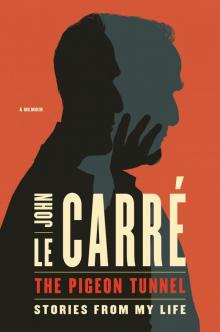 The Pigeon Tunnel: Stories From My Life
The Pigeon Tunnel: Stories From My Life Single & Single
Single & Single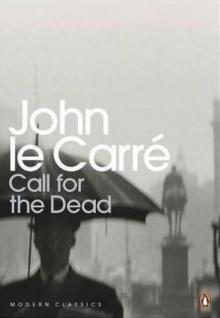 The Spy Who Came in From the Cold
The Spy Who Came in From the Cold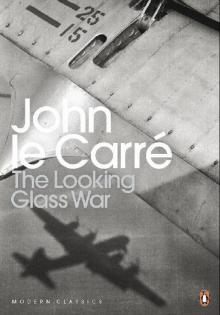 The Looking Glass War
The Looking Glass War The Night Manager
The Night Manager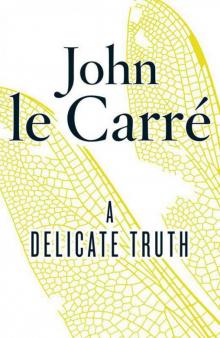 A Delicate Truth
A Delicate Truth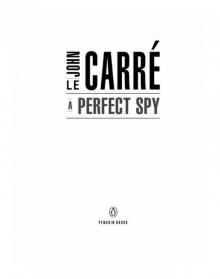 A Perfect Spy
A Perfect Spy The Little Drummer Girl
The Little Drummer Girl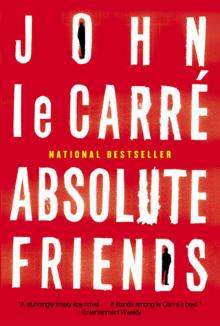 Absolute Friends
Absolute Friends A Murder of Quality AND Call for the Dead
A Murder of Quality AND Call for the Dead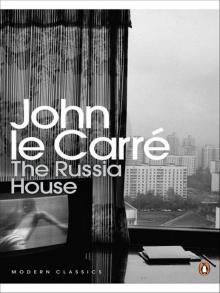 The Russia House
The Russia House The Tailor of Panama
The Tailor of Panama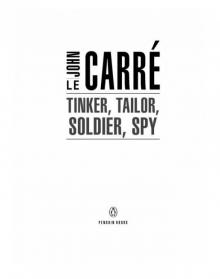 Tinker, Tailor, Soldier, Spy
Tinker, Tailor, Soldier, Spy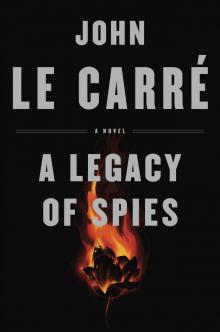 A Legacy of Spies
A Legacy of Spies The Mission Song
The Mission Song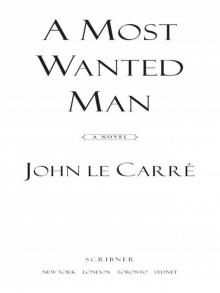 A Most Wanted Man
A Most Wanted Man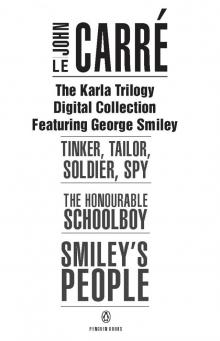 John Le Carré: Three Complete Novels
John Le Carré: Three Complete Novels The Secret Pilgrim
The Secret Pilgrim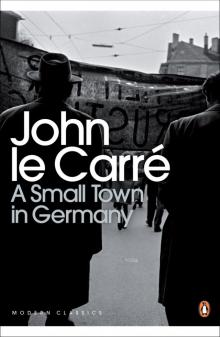 A Small Town in Germany
A Small Town in Germany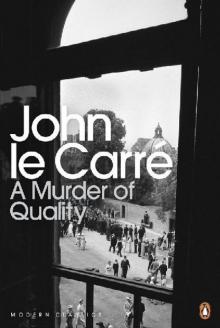 A Murder of Quality
A Murder of Quality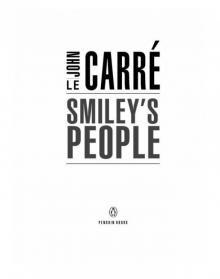 Smiley's People
Smiley's People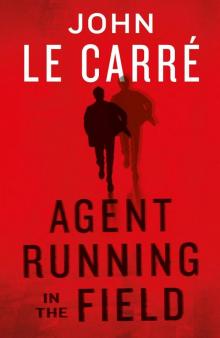 Agent Running in the Field
Agent Running in the Field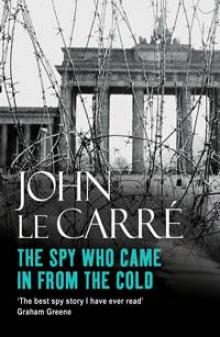 The Spy Who Came in from the Cold s-3
The Spy Who Came in from the Cold s-3 The Pigeon Tunnel
The Pigeon Tunnel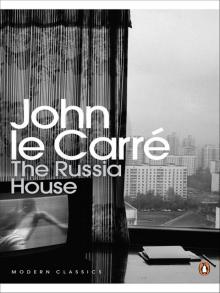 The Russia House - 13
The Russia House - 13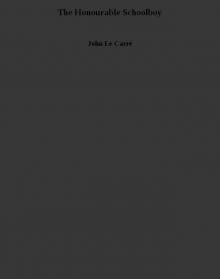 The Honourable Schoolboy
The Honourable Schoolboy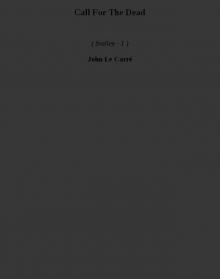 Call For The Dead s-1
Call For The Dead s-1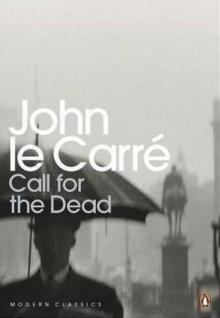 Call for the Dead
Call for the Dead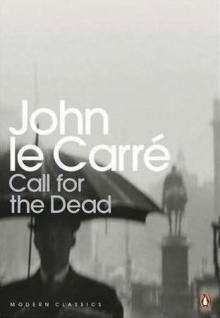 Call for the Dead - 1
Call for the Dead - 1